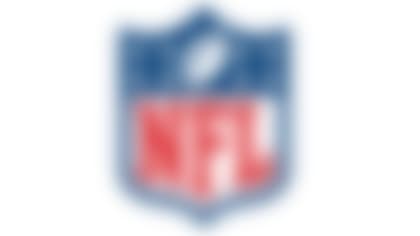In his robust Inside The NFL Notebook below, NFL Network's Albert Breer touches on multiple topics, including (click on each link to take you directly to the topic):
» Four things he's looking forward to in Week 17.
» What the Seahawks' success means for coaching trends.
» A discussion of the NFL's empty-seat problem.
» And much more, beginning with a look at what works with the Pro Bowl and what doesn't ...
Dozens of players will be recognized on Wednesday night for being among the very best at the highest level of football, with invitations to the Pro Bowl to prove it.
For first-timers, it's the culmination of a lifetime spent ascending in the sport. For guys going back, it's an affirmation of the respect they've earned from their peers, coaches and fans. For everyone, it seems the game itself -- over which there has been much hand-wringing in recent years, as the NFL decides what to do with it -- is merely a small part of all that goes along with a selection.
Now, the question: Is that really a problem?
"I don't know why everybody's bitching and complaining," said Washington Redskins cornerback DeAngelo Hall, who's been selected to the Pro Bowl three times. "I'm sure they (the NFL) generate enough revenue not to want to shut it down, so I don't know why there's complaining about the quality of the game. It's not the Super Bowl; it's not a playoff game. It's an all-star game. We need to remember that. It's an all-star game. We go out there to have fun."
As the NFL considers alterations to the overall structure of its calendar this offseason -- shortening the preseason, extending the regular season and expanding the playoffs are expected to be part of those talks -- the Pro Bowl's future will again be on the line.
And while the viewing public largely sees the game as falling embarrassingly short of NFL-quality, the Pro Bowl is hardly a failure on all levels. Last season's Pro Bowl drew a 7.1 television rating, which beat six of the seven games of the NBA's Eastern Conference Finals between the Boston Celtics and Miami Heat as well as an Elite Eight NCAA hoops game between powerhouses Kansas and North Carolina. It also easily outdistanced the ratings garnered by all the other major sports' all-star games. Plus, as Hall said, the players enjoy the experience.
From the league's perspective, there are four primary pros and four primary cons, which build off the same points.
» Pro: Fans like the idea of an all-star game.
» Con: Fans like all-star games because they want to see elite skills on display; that's not what they see at the Pro Bowl.
» Pro: The league gets an extra week of television programming.
» Con: For the true football fan, the action that programming provides is basically unwatchable.
» Pro: Sponsors have liked the game.
» Con: They're starting to see the ratings as hollow, because of the quality of game, which has brought sharp criticism they're hesitant to want to be associated with.
» Pro: The players like it.
» Con: The players like it because it's a vacation, and they treat it as such.
One league source said the players have been given the opportunity to keep the game going as it is, and make it a better product that's closer to NFL quality. Commissioner Roger Goodell solicited opinions from union leaders and veterans across the NFL; the feedback was that players like the Pro Bowl experience, but mainly because they enjoy the social aspects. After the 2012 Pro Bowl, Goodell issued an edict to the players to fix it this year on their own; otherwise, the league could move to alter or eliminate it.
For the league, the concern is the branding damage a subpar game can do.
"It's tough to view it as 'working' now," said Eric Grubman, the NFL's executive vice president of business ventures. "What works about it is there's recognition of great players, the players enjoy it, the fans enjoy it, and it gives people an opportunity to focus on football for a week when there wouldn't be anything. ... What's not working is the players, for their own reasons, have not put on a true NFL quality game. We understand their logic, but there's no getting around it -- it's not an NFL game."
Four years ago, NFL Chief Marketing Officer Mark Waller created the concept of an "NFL Honors" program -- an awards show during Super Bowl week -- which the league saw as a potential replacement for the Pro Bowl. But NFL Network and NBC squabbled over rights; NBC eventually got them, then decided it felt too rushed, and the event was called off. The lockout delayed its resurrection until last February, with NFL Network televising the inaugural NFL Honors show the night before Super Bowl XLVI.
One idea that will be on the table is honoring each conference's all-star teams at that event, and having a college all-star game afterward -- a sort of "Today's Stars Meet Tomorrow's Stars" day -- to replace the Pro Bowl. That game would likely be an existing college event, most likely the Senior Bowl, which would be moved to be part of the NFL calendar, with the thought that it could kick off draft season and highlight prospects on a bigger stage. However, the league would certainly be careful about NCAA rules entanglements.
Another idea that could eventually come into play is bringing the game back to the continental U.S. League officials claimed this worked in early 2010, when the game was played the week before Super Bowl XLIV in South Florida, to generate more coverage and allow more fans to feel like they were a part of the sport's biggest week. But that, of course, doesn't address the problem of the level of play.
There has been some thought to adding a financial incentive, though it seems no one's convinced that would work, either. Redskins linebacker London Fletcher, a three-time Pro Bowl player, conceded that "guys always like money," but emphasized that the real issue with making the Pro Bowl competitive is that "you get a franchise quarterback injured in an all-star game, the NFL's gonna be upset, the owners are gonna be upset."
Grubman added, "If I had to guess, five or 10 years from now, there would be a celebration of the best NFL players, the best performances, a focus on records and achievements, and less of a focus on the field."
Instant Debate: Top offensive rookie
Strong cases can be made for three QBs to win rookie of the year. Will **Russell Wilson** take the honor? Let's debate! **More ...**
Some players would advocate that the league simply recognize the game for what it is -- an exhibition that isn't supposed to represent real NFL action.
As Fletcher pointed out, the rules implicitly say that anyway.
"You're not allowed to blitz, you're not allowed to run games, you're only playing certain coverages. So it's hard to really have the effort that you want, because they really don't want D-linemen getting after the quarterback. If that's what they want? I bet you'd see even more guys, especially the quarterbacks, not wanting to play."
The other side of this: Hall recalls his young son and Drew Brees having a nice moment in Hawaii, and cites Peyton Manning, who never skips out, as a player who embodies the meaning of the event by using it to build camaraderie among competitors.
So the game isn't played like the Ice Bowl? Well, to the players, that's OK.
"It's an all-star game," Hall said. "You're not trying to beat the (expletive) out of each other. We've done enough of that for 16, 17 weeks, and adding in playoffs. We're going out there to have fun."
In the coming months, we'll find out if that's enough to keep this beleaguered event alive.
Four things I'll be looking for Sunday
1) The effects of flex-scheduling.The NFL moved this week's Green Bay Packers-Minnesota Vikings and Miami Dolphins-New England Patriots games to late afternoon, and a different impact on scoreboard-watching will be felt in each case. Moving Packers-Vikings won't seriously affect the competition. The one upshot is if the Packers had played earlier in the day and won, that would've rendered the Arizona Cardinals-San Francisco 49ers game meaningless, with San Francisco locked into the third seed in the NFC. The game means something to the Vikings either way, since the only way they can get into the playoffs with a loss involves the Dallas Cowboys, who don't play until prime time. For New England, on the other hand, things could get interesting. If the Baltimore Ravens lose and the Houston Texans win earlier in the day, and the Denver Broncos jump all over the Kansas City Chiefs at home, Bill Belichick could well start managing his roster with the knowledge that a bye is out of reach and his team will have a game to get ready for the next weekend. So my educated guess is that, in that case, someone would be in the coach's headset, keeping him apprised of the goings on two time zones away.
2) The Washington Redskins' defense's big test. Coordinator Jim Haslett's group hasn't set the world on fire -- it ranks 28th in total defense -- but considering the circumstances, the Redskins have done a heck of a job mitigating the damage. While Robert Griffin III was, deservedly, drawing the public's affection, the defense lost its best player (Brian Orakpo) and best defensive lineman (Adam Carriker) as well as both starting safeties, its top two reserve corners, and a valuable backup at nose tackle. Things got rocky midseason, but the situation has stabilized since, with the 'Skins yielding 21 or fewer points in five of their past seven games. Haslett explained that, during the team's bye week, they reconfigured things, and started playing more guys. One example of this approach working is how Washington has played four different guys at safety regularly, each on a situational basis. "The guys know who they are," Haslett told me. "You lose 'Rak,' your best rusher, you have to adjust a lot of different things. We've been doing things different every week, based on who we have out there. You do whatever you can to win a game. ... We try to put our players in the best position to utilize them, and that allows them to be aggressive in what they're doing." This week, they get another shot at one of the two offenses that scored more than 21 in that span -- the Dallas Cowboys. The stakes are, obviously, high. One other thing from Haslett, while we're here; he called Orakpo, "the second-best player on our team." So I asked him, "Who's No. 1?" He responded, "The quarterback's pretty good."
3) The deployment of Tim Tebow. I hate to go here, I really do, mainly because the subject's been beaten into the ground and the New York Jets and Buffalo Bills are a combined 11-19. But I do think the future of one of football's most famous players could be on the line, which makes it worth examination. Start with this: Had most any other guy asked out of action because he didn't like his role, as a source confirmed Tebow did last week, he'd be eviscerated. This also isn't necessarily a completely isolated thing for Tebow either, when you consider the billboard incident that my NFL.com colleague Jeff Darlington reported on last year. So where could this have a lasting effect? I know the Jacksonville Jaguars thing is out there for Tebow, but that likely wouldn't be for long. If you want to see where Tebow really could carve out a 15-year NFL career, look to Michael Robinson, who was the 2005 Big Ten Player of the Year as a quarterback for Penn State but remade himself as a meat-and-potatoes fullback in the NFL. Robinson made it work because he was willing to make it work. On the flip side, former Heisman Trophy winner Eric Crouch was less willing, and he was quickly out of the NFL. That's why this week could be an important one for Tebow. If he pops back up as a situational quarterback and a special teams player, it means he'll have subjugated his ego, and that could send a nice message about his intentions regarding being a football player long-term, and not just as a quarterback.
4) The many different dynamics of Texans-Colts. As it should be, Chuck Pagano's return to the sideline will be the dominant storyline at Lucas Oil Stadium on Sunday. But there are so many other aspects to this AFC South battle that make it among the most compelling games on the slate. On Indy's side, outside of Pagano, there's the willingness to put Andrew Luck back out there against a defensive front that spent an entire afternoon inspecting his rib pads just two weeks ago, and in a game that has no playoff implications for the Colts. The Colts also might consider that it could be wise to keep moving forward, given that they're a young team playing a bit over their heads. For Houston, this game couldn't be much more important. With a vulnerable defense on the other side, can Matt Schaub bounce back from a 178-yard, zero-touchdown performance against the Vikings? Can Houston's defense, ravaged by injury, find a way to hold it together on the back end with Reggie Wayne there to terrorize the secondary? Most of all, with the No. 1 seed on the line, can Gary Kubiak's team deliver a statement going into the playoffs? If the answer to all those questions is "No," the Texans could finish Sunday with the third seed in the AFC, which would've been pretty hard to forecast a month ago.
Three conclusions
1) The Seattle Seahawks have perfectly illustrated why college coaches could be in demand next week after the regular season has concluded. Pete Carroll's done a number of things right since re-entering the NFL in 2010, but maybe the most vivid accomplishment is easy to decipher each week: His Seahawks have a true, honest-to-goodness identity. They're fast. They're competitive. They're a little unconventional (big cornerbacks, small quarterback), but they're marked by football players, left and right. Even the new uniforms and raucous crowd play into it. In short, Carroll has brought to life the term "program-builder," which is what owners are looking for when they dip into the college ranks. It explains why Chip Kelly, who sources expect to have a handful of NFL suitors (watch the Philadelphia Eagles) after next week's Fiesta Bowl, will be in such demand after helping to elevate Oregon as a college football brand. And it tells you why he won't be the only one. Last year, Northwestern's Pat Fitzgerald and Washington's Steve Sarkisian were pursued by the St. Louis Rams, but both turned down interviews. Syracuse's Doug Marrone was discussed too. Expect those three, and maybe more, to draw interest in the coming days.
2) Calvin Johnson and Adrian Peterson can provide a powerful draft lesson, one that's especially valuable in a year like this one: Sometimes reaching for the quarterback, even if that position is easily the most important, isn't the best idea. That's what the Oakland Raiders did in 2007, taking JaMarcus Russell with the first overall pick. Russell was seen as an intriguing though risky pick back then, while Johnson and Peterson (though he had a broken collarbone) were viewed as transcendent talents. Six seasons later, Johnson's breaking the single-season receiving record, Peterson has a shot at the single-season rushing mark, and Russell is back home in Alabama. Think the Raiders would take that one back? It's something to keep in mind, with this year's crop of quarterbacks universally considered subpar, and with two teams that could use a triggerman (the Jacksonville Jaguars and Kansas City Chiefs) set to top the draft board. (Thanks to a loyal Twitter follower for suggesting this idea to me last week.)
3) Janoris Jenkins should be the Defensive Rookie of the Year. And that's not just about the St. Louis Rams cornerback's three pick-sixes, which are as many as Deion Sanders (the preeminent pick-sixer of all-time) ever had in a single season (Jenkins also has a fourth TD on a fumble return). I spoke with Rams folks this week, and though they conceded that he's had his moments gambling and missing, they said they feel that, on balance, he's been playing at a Pro Bowl level through this season, and cited a few different reasons. First, there's the degree of difficulty in the position he's put in as a man corner. Second, there's the fact that they already view him as one of the NFL's top tackling corners, evidenced best, perhaps, by how he ran down and stopped Peterson late against the Vikings in Week 15 to keep the Rams within two possessions. Third, there's how his big plays have, almost always, come in critical junctures. Now, St. Louis isn't out of the woods yet when it comes to this draft-day gamble; let's let the kid get through an offseason without incident first. But things are looking really good right now for a player many scouts put in the talent ballpark of Joe Haden and Darrelle Revis.
Two college players to watch this week
1) Syracuse QB Ryan Nassib (vs. West Virginia, New Era Pinstripe Bowl, Saturday, ESPN, 3:15 p.m. ET): As we mentioned, the 2012 quarterback crop isn't lush, a fact that opens the door for dark horses to rise, and Nassib might be the preeminent dark horse coming out. "He's gonna end up being one of those guys," said one NFC exec. "I like his arm, his release, his mechanics, and he's really strong -- he can throw the (expletive) out of the ball. He's ready, too." The exec continued that he needs to work on "his decision-making; he has such a strong arm, he tries to show it off too much, he needs to work on his finesse game, his touch," but said that while he's seen as a third- or fourth-round pick, Nassib could conceivably go in the second round, particularly considering his experience under Marrone, who was Sean Payton's offensive coordinator with the New Orleans Saints in 2006.
2) TCU WR Josh Boyce (vs. Michigan State, Buffalo Wild Wings Bowl, Saturday, ESPN, 10:15 p.m. ET): Boyce was actually a church-league basketball teammate of RG3's at seven years old; the two also played high school football together in Copperas Cove, Texas. Since then, the lesser-known member of that duo has grown into one of college football's most consistent receivers, and a definite mid-round sleeper of a prospect who gets a chance this week to prove himself outside the defense-deficient Big 12. "He's been their best receiver for two years, a really good athlete," said one AFC college scout. "Not super explosive, but very smooth and natural, and he's got really good ball skills." All of which is to say that Boyce is the type of receiver who can stick and be productive as a pro for a decade.
One prediction
Brandt: Surprise teams for 2013
Gil Brandt identifies six non-playoff teams with the potential to make some serious noise in the 2013 campaign. **More ...**
Empty seats will make Black Monday even darker. To its credit, the NFL hasn't run and hidden from its problem getting rear ends in the stands. On the contrary, the league has been up front about the need to do more to attract fans out of their living rooms -- where they can watch every game in high definition, in a controlled climate, with no line for the bathroom and no overpriced concessions -- and into stadiums.
My guess is that this dynamic, which has left thousands of seats empty this December in the homes of also-rans, has gotten the attention of owners. Whether it's a conscious thing or not, that's going to increase the urgency the bosses feel to do something, anything, to invigorate the fan base in such places. And since firing all the players isn't a viable option, and a headline-grabbing player isn't always available to add, a high-profile coaching change will be the antidote for a lot of teams.
That's the way it's worked in the NBA and NHL for years. The NFL isn't immune anymore.
The second domino there: More capable men will be unemployed and, perhaps, more fired general managers and coaches will be recycled. Count Cleveland Browns GM Tom Heckert and Kansas City Chiefs GM Scott Pioli as two who could get second chances quickly.
Follow Albert Breer on Twitter @AlbertBreer.



